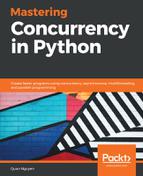The problem with the first approach is that, when a reader is accessing the text file and a writer is waiting for the file to be unlocked, if another reader starts its execution and wants to access the file, it will be given priority over the writer that has already been waiting. Additionally, if more and more readers keep requesting access to the file, the writer will be waiting infinitely, and that was what we observed in our first code example.
To address this problem, we will implement the specification that, once a writer makes a request to access the file, no reader should be able to jump in line and access the file before that writer. To do this, we will have an additional lock object in our program, to specify whether a writer is waiting for the file, and consequently, whether a reader thread can attempt to read the file; we will call this lock read_try.
Similar to how the first of the readers accessing the text file always locks it from the writers, we will now have the first writer of the multiple that are waiting to access the file lock read_try, so that no reader can, again, jump in line before those writers that requested access before it. As we discussed in reference to the readers, since we are keeping track of the number of writers waiting for the text file, we will need to implement a counter for the number of writers, and its corresponding lock, in our program.
The Chapter13/example2.py file contains the code for this implementation, as follows:
# Chapter13/example2.py
import threading
def writer():
global text
global wcount
while True:
with wcounter:
wcount += 1
if wcount == 1:
read_try.acquire()
with resource:
print(f'Writing being done by
{threading.current_thread().name}.')
text += f'Writing was done by
{threading.current_thread().name}. '
with wcounter:
wcount -= 1
if wcount == 0:
read_try.release()
def reader():
global rcount
while True:
with read_try:
with rcounter:
rcount += 1
if rcount == 1:
resource.acquire()
print(f'Reading being done by
{threading.current_thread().name}:')
print(text)
with rcounter:
rcount -= 1
if rcount == 0:
resource.release()
text = 'This is some text. '
wcount = 0
rcount = 0
wcounter = threading.Lock()
rcounter = threading.Lock()
resource = threading.Lock()
read_try = threading.Lock()
threads = [threading.Thread(target=reader) for i in range(3)] +
[threading.Thread(target=writer) for i in range(2)]
for thread in threads:
thread.start()
Compared to our first solution to the problem, the main program remains relatively the same (except for the initialization of the read_try lock, the wcount counter, and its lock, wcounter), but in our writer() function, we are locking read_try as soon as there is at least one writer waiting to access the file; when the last writer finishes its execution, it will release the lock, so that any reader waiting for the file can now access it.
Again, to see the output produced by the program, we will have it run for 3-4 seconds, and then cancel the execution, as the program would otherwise run forever. The following is the output that I obtained via this script:
> python3 example2.py
Reading being done by Thread-1:
This is some text.
Reading being done by Thread-1:
This is some text.
Writing being done by Thread-4.
Writing being done by Thread-5.
Writing being done by Thread-4.
Writing being done by Thread-4.
Writing being done by Thread-4.
Writing being done by Thread-5.
Writing being done by Thread-4.
...
It can be observed that, while some readers were able to access the text file (indicated by the first four lines of my output), once a writer gained access to the shared resource, no reader was able to access it anymore. The rest of my output included messages about writing instructions: Writing being done by, and so on. As opposed to what we saw in the first solution of the readers-writers problem, this solution is giving priority to writers, and, as a consequence, the readers are starved. This is therefore called writers-preference.
The priority that writers were given over readers resulted from the fact that, while only the first and the last writers have to acquire and release the read_try lock, respectively, each and every reader wanting to access the text file have to interact with that lock object individually. Once read_try is locked by a writer, no reader can even attempt to execute its instructions, let alone try to access the text file.
There are cases in which some readers are able to gain access to the text file, if the readers are initialized and executed before the writers (for example, in our program, the readers were the first three elements, and the writers were the last two, in our list of threads). However, once a writer is able to access the file and acquire the read_try lock during its execution, starvation will most likely occur for the readers.
This solution is also not desirable, as it gives higher priority to the writer threads in our program.
